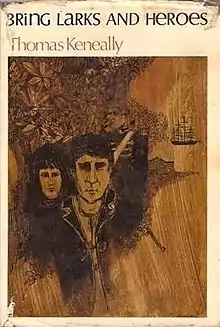Bring Larks and Heroes
Bring Larks and Heroes is a 1967 novel by Australian author Thomas Keneally[1] which won the Miles Franklin Award in 1967.[2]
 First edition | |
| Author | Thomas Keneally |
|---|---|
| Country | Australia |
| Language | English |
| Publisher | Cassell, Australia |
Publication date | 1967 |
| Media type | Print (Hardback & Paperback) |
| Pages | 247 pp |
| ISBN | 0-7251-0060-5 |
| OCLC | 27549590 |
| Preceded by | The Fear |
| Followed by | Three Cheers for the Paraclete |
Plot summary
The novel is set in an unidentified Penal colony in the South Pacific, which bears a superficial resemblance to Sydney. The novel is concerned with the exploits of the colony's "felons" (a term which was not in general use at the time the novel is set, which Keneally explains his use of in a brief preface as being more appropriate than "convicts"), in particular an Irish Marine named Phelim Halloran.
Halloran joins the marines after leaving prison and finds he identifies more with the Irish prisoners than his mainly Protestant English superiors.[3]
Critical reception
London-based Australian critic Robert Hughes stated in The Times: "Here is a rarity — an Australian novelist who does not use his Strine literary context as a prop or an excuse, and thus remains sensitive to his actual and physical environment... He is the first novelist to use Australia's colonial past intelligently, neither sentimentalising it as woozy bush-balladry nor turning it into an ersatz myth".[4]
Leonard Ward in The Canberra Times: "Thomas Keneally's writing style is smooth and economical of words with sometimes a curious lilt to them, even when he is dealing in brutality and tragedy. He is certainly one of the best Australian novelists today."[5]
Dedication
"To Judith who nursed this poor herd of chapters to pasture."
Publishing history
Following its original publication by Cassell in 1967 (reprinted in 1967 and 1968), the novel went through the following editions:
- Belmont Books, New York, 1967
- Sun Books, Melbourne, 1968 (reprinted 1972, 1974, 1976, 1978, 1984)
- Viking, New York, 1968
- Quartet, London, 1973
- Penguin, Victoria, 1988
- Text Publishing, Text Classics, Victoria, 2012[6]
References
- Austlit - Bring Larks and Heroes by Thomas Keneally
- "Novel Award", The Canberra Times, 3 April 1968, p3
- Musings of a Literary Dilettante
- "Praise in UK for Keneally", The Canberra Times, 27 February 1968, p15
- "Keneally's strong character-building", The Canberra Times, 18 November 1967, p10
- Text Publishing - Bring Larks and Heroes by Thomas Keneally
| Awards and achievements | ||
|---|---|---|
| Preceded by Trap |
Miles Franklin Award recipient 1967 |
Succeeded by Three Cheers for the Paraclete |